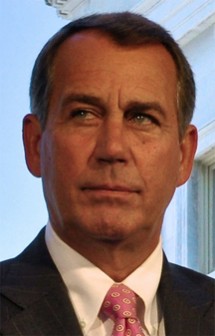WASHINGTON, (Reuters) – U.S. House of Representatives Speaker John Boehner caved in to growing criticism from within and outside his Republican Party, agreeing yesterday to a short-term deal to extend a payroll tax cut for 160 million Americans.

In a dramatic reversal that appeared to end a standoff with Democrats, Boehner told Senate Majority Leader Harry Reid he would set a vote in the House on a Senate-passed two-month extension of the tax cut and jobless benefits – key supports for a fitful U.S. economic recovery.
The Republicans’ about-face contrasts with a year of dominance in Congress in which their staunch opposition to higher taxes and spending yielded a string of successes.
Their backpedalling this time handed a rare victory to President Barack Obama and his fellow Democrats as well as much-needed momentum going into the November 2012 election.
In the battle of optics, Boehner and the party that fights for lower taxes found themselves being blamed for not helping avert a tax hike for middle-class Americans come Dec. 31.
“We have fought the good fight. Why not do the right thing for the American people even though it’s not exactly what we want,” a deflated Boehner told a news conference after giving up his push for a one-year deal that faced near impossible odds.
The House could hold a simple “voice vote” today that requires only a few members to be present and frees Republicans from having to cast politically difficult recorded votes. The Senate would also vote today.
That procedure allows Boehner to push through the bill despite opposition from his often fractious caucus in which Tea Party fiscal conservatives wield outsized influence.
Boehner told members about Thursday’s deal in a muted conference call in which they could ask no questions. In a similar call last weekend, he faced an outcry from members who opposed a short-term deal, forcing him to reject the Senate bill and precipitating this week’s crisis.
Obama, who repeatedly used the bully pulpit of his office this week to push Boehner to do a deal, said in a statement he hoped Congress would keep working to “extend this tax cut and unemployment insurance for all of 2012 without drama or delay.”
Under a deal agreed to by Boehner and Reid, both parties will immediately appoint negotiators to forge the full-year deal sought originally by Obama and most recently by House Republicans who said a two-month fix created uncertainty.
The capitulation followed days of pressure on Boehner, from fellow Republicans in the Senate and conservative circles and from the White House and Democrats, who analysts said were winning the messaging war.
But maybe most crucial for breaking the impasse on Thursday was the intervention of Senate Republican leader Mitch McConnell, who called on the House to pass a temporary extension and then move to congressional negotiations on a payroll tax cut that would extend through 2012.
The two sides are deadlocked over how to pay for a full-year deal on extending the payroll tax cut, long-term unemployment benefits and payments to doctors treating patients under the Medicare healthcare system for the elderly.
To cover a portion of the nearly $200 billion price tag, Democrats initially sought a surtax on the wealthiest Americans while Republicans wanted to pay for it through spending cuts.





